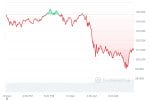Last updated:
 Why Trust Cryptonews
Why Trust Cryptonews

Nigeria is planning to revise its regulations to include crypto trading and digital transactions taxation in its regulatory framework, which would enhance government revenue.
According to a Bloomberg report, the Nigeria Securities and Exchange Commission (SEC) has announced plans to implement new rules to ensure that eligible transactions on regulated exchanges are taxed appropriately.
A bill detailing the taxation framework is currently under consideration by lawmakers and is anticipated to be adopted within the current quarter.
The SEC also intends to broaden crypto licensing, enabling more centralized exchanges to function, thus enhancing government oversight and taxation.
Nigeria’s Push for Crypto Taxation and Fiscal Reforms
Nigeria has become one of Africa’s top cryptocurrency adopters, fueled by a young, tech-savvy population and a persistent economic crisis characterized by inflation and a declining naira.
The government, aiming to capitalize on tax revenue from the booming crypto sector, is introducing measures to formalize the industry.
The SEC’s proposed regulations will require taxing all transactions on regulated exchanges.
While the exact revenue potential remains unspecified, officials acknowledge that substantial gains can be made.
Lawmakers are reviewing a bill to establish the legal framework for taxing crypto transactions and implementing other levies.
This legislative move aligns with broader fiscal policies under Tinubu’s administration, which has prioritized tax administration reforms to increase government revenue.
Nigeria’s parliament recently approved a record 54.99 trillion naira ($36.4 billion) spending plan for 2025, further showing the government’s need for increased revenue streams.
In addition to taxation measures, the SEC is working to expand the licensing framework for cryptocurrency exchanges, encouraging a shift toward centralized trading platforms.
The regulator believes centralized exchanges will provide better investor protection, enhanced transparency, and a more structured taxation environment.
Expansion of Centralized Exchanges and Regulatory Oversight
Currently, many Nigerians rely on peer-to-peer (P2P) crypto trading due to restrictions on banks facilitating crypto transactions.
However, the SEC anticipates a gradual migration to formal exchanges, where transaction monitoring and compliance with tax regulations will be easier to enforce.
The licensing initiative aims to regulate more exchanges and ensure that transactions occur within a taxable framework.
This new decision might follow up on the in-principle approval for some exchanges last year.
In August last year, Nigeria’s SEC granted provisional approval to two digital asset exchanges, Busha Digital Limited and Quidax Technologies Limited, under its Accelerated Regulatory Incubation Programme (ARIP).
This approval allows them to operate within a regulated framework while testing their business models.
Alongside these exchanges, five other digital asset firms have been admitted to the SEC’s Regulatory Incubation Program (RI) to evaluate their services in a controlled environment.
The SEC introduced these initiatives to integrate firms operating before its virtual asset regulations took effect in May 2022. The aim is to foster innovation while ensuring compliance.
At the same time, Nigeria’s SEC proposed stricter penalties for cryptocurrency-related fraud, including fines of up to $12,000 or a 10-year prison sentence.
However, the move solely aims to deter scammers who exploit the term “cryptocurrency” to deceive investors as Nigeria continues to struggle with fraudulent schemes that have damaged its reputation and financial sector.
Despite being one of the world’s largest crypto markets, with high adoption rates and strong public interest, Nigeria has faced regulatory hurdles.
Authorities have taken a hard stance against major exchanges. In 2023, the SEC declared Binance Nigeria Limited illegal, and in 2024, Binance and OKX were eventually pushed to exit the market.
The legal disputes between Binance and the Nigerian government, especially between the former Binance executive Tigran Gambaryan, have further complicated the country’s crypto landscape with ongoing legal disputes on the case.




